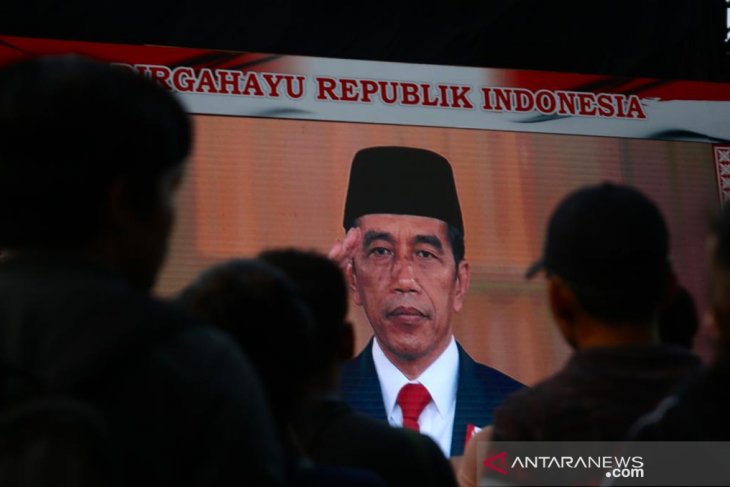Live Streaming
Program Highlight
Company Profile

Program Highlight (3019)

PLN Gradually Recovers Electricity Supply (0)
State-owned electricity firm PT PLN has recovered electric power to Balaraja Extra High Voltage substation in Banten Province, and furthermore it will be channeled to Suralaya steam-fueled power plant (PLTU) to gradually recover its operation to reach its capacity of 2800 MW of electricity.
In addition, power supply from Gandul Extra High Voltage substations in Depok, West Java Province, will be channeled to Muara Karang gas and steam power plant (PLTGU) to supply electricity to the Indonesian capital city, Jakarta.
Acting President Director of PLN Sripeni Inten Cahyani said here on Sunday that the power supply to Jakarta was expected to recover within three hours.
"We apologize for the inconvenience today, and currently all efforts have been made to recover the Java-Bali power system, especially in the area of West Java, Banten, and Jakarta," Cahyani said.
The company has focused on power supply to PLTGU Muara Karang and PLTGU Priok to recover the system in the capital city.
Previously, PLN has recovered the operation of hydro-generated power plant (PLTA) Saguling and PLTA Cirata which are functioned as power stabilizer, and, at the same time, supply the electricity to PLTU Suralaya through Cibinong, Depok, Gandul, Lengkok, Balaraja and Suralaya extra high voltage substations.
PLTU Suralaya is expected to return to its normal operation within six hours to normalize power system in West Java and Banten.
Blackout that affected thousands of homes and public facilities in West Java, Jakarta, and Banten was caused by several troubles in the extra high voltage 500 kV transmission of Ungaran - Pemalang.
"PLN has taken its best efforts and will have evaluation to prevent recurrence of today's incident," Cahyani said.
more news
President Joko Widodo Visits the Site of the Future New Capital City
Written by Ani Hasanah
President Joko Widodo continued the agenda of his working visit in the province of East Kalimantan, Tuesday (12/17/2019) afternoon, by visiting the location of Indonesia’s new capital city. The location that the President visited was in the concession area of PT ITCI at Sepaku District, Penajam Paser Utara Regency.
This is the first visit of the Head of State after the government decided North Pener Pasajam and Kutai Kartanegara as the nation's capital.
The President explained that 256 thousand hectares of land would be used and reserved for the new state capital region. Of this area, 56 thousand hectares will be used for the core area, with a government area of 5,600 hectares.
According to the Head of State, the location of the Palace will be determined after the idea design is decided then drawn in detail, which is expected to be completed within 6 months. The President hopes that the infrastructure development will begin in mid 2020.
"But what will be done first is the government area of 5600 government clusters, which later we hope it will also be parallel with the construction of health clusters, education clusters, research and innovation, financial centers. so clearly the location is very supportive for a smart city, complex city, then green city, said the President.
In terms of regulations, the President said that the government would immediately submit a draft law (RUU) related to the new national capital to the House of Representatives (DPR).
Meanwhile, related to the form of the new state capital administration later, the President said that the matter would be discussed by the government together with the Parliament.
The process of moving the national capital will be carried out by the Capital Authority Agency (BOI). The President said an authority agency is scheduled to be established in the end of December.
"This is what is being processed, whether this is what we call a city, which will be there in the city manager or later a province. This is what will be decided soon. but most importantly, the Capital Authority Agency (BOI) will soon be formed in late December or early January," said President Joko Widodo.
Until now, the Head of State himself has not yet decided who will lead the Capital Authority. Accompanying the President while observing the location of the new capital city were, among others, Minister / Head of National Development Agency (Bappenas) Suharso Monoarfa, Minister of State-Owned Enterprises Erick Thohir, Minister of Public Works and People’s Housing Basuki Hadimuljono, Minister of Environment and Forestry Siti Nurbaya, Minister of Agrarian and Spatial Planning Sofyan Djalil, Minister of Home Affairs Tito Karnavian, and Cabinet Secretary Pramono Anung. (VOI / Ndy / AHM)
Voice of Indonesia Organizes Diplomatic Forum on Women's Participation in Development
Written by Ani HasanahVoice of Indonesia held its 34th edition of Diplomatic Forum talk show in Jakarta on Tuesday (12/17) with the theme Strengthening Women's Participation in Development. This theme was chosen in connection with the celebration of National Mother's Day which is celebrated every December 22nd. In his remarks, Director of Voice of Indonesia said that women have the same potential as men, including in supporting the national development. Agung Susatyo further said that gender equality is a key factor for sustainable economic growth.
"Gender equality is a key factor for sustainable economic growth, social development and environmental sustainability. By providing the same opportunities to women and men, including in decision-making in all kinds of activities, a sustainable path of development can be achieved to ensure that women’s and men’s interests are both taken into account in the allocation of resources," said Agung Susatyo.
The Diplomatic Forum talk show held by Voice of Indonesia featured speakers namely Ghafur Dharmaputra, Deputy for the Coordination of Women and Children Protection, the Coordinating Ministry for Human Development and Culture; Jari Sinkari, Ambassador of Finland to Indonesia; Ryce Chancai, Gender & Governance Specialist, UN Women Indonesia; and Adriana Venny Aryani, Commissioner of the National Commission for Women. (VOI / AHM)
December
President Urges Regional Heads to Facilitate Investors
Written by Ani HasanahPeople watched President Joko Widodo at a screen outside the Merdeka Palace during the celebration of the 74th Independence Day of Indonesia in Jakarta, Saturday (Aug 17, 2019) (ANTARA)
President Joko Widodo (Jokowi) has urged the regional heads to help facilitate investors who want to invest their capital in the regions. "The local government should give permission quickly if, for example, private sectors wanted to build a port, an airport, or a road, especially, in export-oriented industries," President Joko Widodo said when opening the National Development Planning Forums (Musrenbang) in Jakarta Monday.
Export-oriented industries can also improve Indonesia's trade balance deficit, according to President Jokowi.
They can also create employment opportunities for the people in the region, thereby increasing economic movements.
President Jokowi also asked local governments to consult with the Ministry of Public Works and Public Housing (PUPR), if, they could not carry out development.
The regional governments had built infrastructures such as an airport or a port to connect with industrial centers, he explained and added that improvement in the quality of Human Resources (HR) should be carried out in the future.
If the foundation of development in both infrastructure and human resources can be completed, Indonesia's economic competitiveness would increase sharply, President Jokowi believed.
He opened a meeting attended by several ministers as well as regional heads from all regions of Indonesia.
Jokowi also explained various efforts needed to encourage development in the area of human resources, the Omnibus Law, and simplification of regulations. (ANTARA)
December
Indonesia Fosters Advancement of Multilateralism, Connectivity at ASEM
Written by Ani Hasanah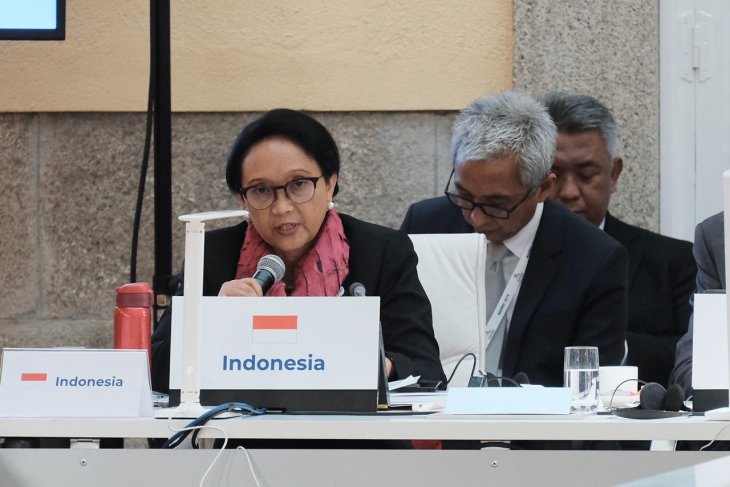
Indonesian Foreign Minister Retno Marsudi addressed the 14th Asia-Europe Ministerial Meeting in Madrid, Spain, on Monday (Dec 16, 2019) ANTARA
Indonesian Foreign Minister Retno Marsudi endorsed the promotion of connectivity and multilateralism at the 14th Asia-Europe Ministerial Conference that began in Madrid, Spain, on Monday (Dec 16).
"Asia and Europe must better promote sustainable connectivity," Marsudi noted in a written statement released on Tuesday.
At the plenary meeting of ASEM foreign ministers, Marsudi put the spotlight on the strategic outlook in creating sustainable connectivity, especially in an era replete with uncertainty.
From ASEAN’s experience, the regional grouping's strategic outlook has helped in creating the ASEAN community related to dialog and cooperation values. The values have laid down the foundation for the initiative of the ASEAN Outlook on Indo-Pacific (AOIP), she remarked.
"Asia and Europe must strengthen the strategic outlook that promotes collaboration, inclusive and open economy, and mutually beneficial paradigm," she stated.
At the retreat session, the Indonesian foreign minister reiterated the significance of maintaining cooperation and the principles of multilateralism to tackle a barrage of global issues, including Palestine and sustainable development goals (SDGs), including palm oil that has aided efforts to purge poverty in Indonesia.
During her visit to Madrid, Marsudi also held bilateral talks with foreign ministers of Austria, Bangladesh, China, and Kazakhstan; ASEAN secretary general; and state secretary of the Swedish prime minister.
The ASEM foreign ministers’ meeting themed “Asia and Europe: Together for Effective Multilateralism” discussed an array of issues encompassing multilateralism, gender equality, counterterrorism, maritime security, and cyber security. (ANTARA)
December
President Targets 14-Percent Reduction in Stunting Rate in Five Years
Written by Ani Hasanah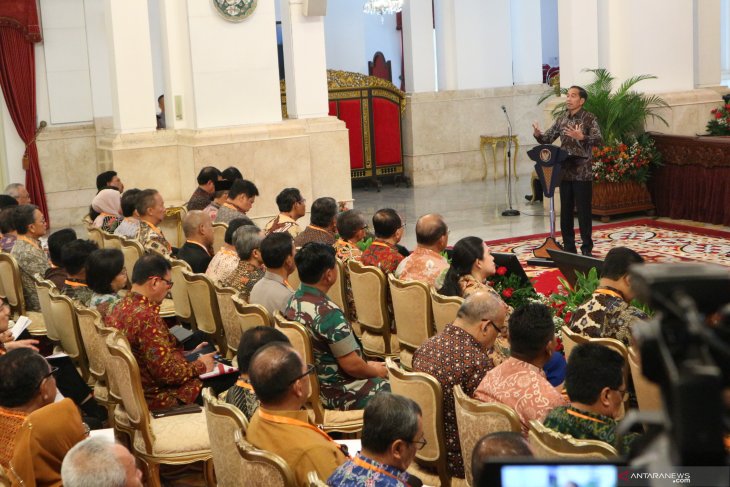
President of Indonesia Joko Widodo delivered a speech on reducing stunting or chronic hunger prevalence in the country at the launch of the deliberation on the national medium-term development plan (RPJMN) for 2020-2024 period at the Presidential Palace in Jakarta, Monday (Dec 16, 2019). (ANTARA)
President Joko Widodo is zeroing in on reducing the prevalence of stunting or chronic hunger in Indonesia by at least 14 percent in the next five years to improve the quality of Indonesian human capital. President Widodo remarked at the launch of the deliberation on the national medium-term development plan (RPJMN) for the 2020-2024 period at the Presidential Palace, Jakarta, Monday. Following his targets, the president reiterated the significance of feeding nutritious meals to children and students in schools. Apart from nourishing meals, President Widodo also prompted local governments to reduce the maternal mortality rate. The Indonesian government has outlined a target to reduce the prevalence of stunting to under 20 percent by 2024. In the past, a large number of cases of chronic hunger had been observed in several provinces, including East Nusa Tenggara and East Java. (antara)
President Joko Widodo Wants to Open Investment for Imported Substitution Goods
Written by Ani HasanahPresident Joko Widodo re-emphasized the importance of reducing import figures in a bid to maintain positive economic growth. When opening a Limited Cabinet Meeting on the Acceleration of the Implementation of the Industry and Trade Program at the State Palace in Jakarta, Wednesday (11/12), he highlighted the high number of imports of raw materials and auxiliary raw materials reaching more than 70 percent. Data from the Central Statistics Agency shows that imports of raw materials and auxiliary raw materials reached 74.06 percent of the total imports for the period January to October 2019. Meanwhile, imports of goods and imports of consumer goods reached 16.65 percent and 9.29 percent respectively. Of this figure, the type of raw material with the highest number of imports is steel, reaching US$ 8.6 billion dollars. Meanwhile, the organic or petrochemical chemical industry reached US$ 4.9 billion dollars. Thus, President Joko Widodo hopes that his aides will open up investment opportunities, especially for the substitute goods industry.
“ Moving on from the data, I ask for investment opportunities, please underline this, the import substitution industry must be wide open. That means that steel, chemical or petrochemical industries must really be opened. Becausethis is an import substitution. This should be noted by BKPM (Investment Coordinating Board). So, the notes are Coordinating Minister for Maritime Affairs and Investment," said Joko Widodo.
Furthermore, President Joko Widodo also asked his aides to take concrete steps to encourage the growth of the processing industry, petrochemicals, including the acceleration of the mandatory biodiesel B30. He emphasized that the growth of the manufacturing industry not only produces imported substitutes, but also opens up huge employment for the community. In addition, President Joko Widodo also called for an increase in the campaign for the use of domestic industrial products, including the optimization of the Domestic Component Level in government projects so that import figures can be suppressed. (VOI/Ndy)
December
Jokowi Stresses on Raising Financial Literacy to Boost Micro Economy
Written by Ani Hasanah
resident Joko Widodo delivered his speech at the meeting of the national team on acceleration of regional financial access (TPAKD) in Jakarta on Tuesday (Dec 10, 2019). ANTARA
President Joko Widodo (Jokowi) has put his weight behind improving financial literacy and inclusion among Indonesians to access banking services to drive micro economic growth.
"This is crucial since from here we can improve the family's economy, our micro economy," Jokowi remarked during a coordination meeting of the national team on acceleration of regional financial access (TPAKD) in Jakarta on Tuesday.
The head of state is upbeat about the Financial Services Authority (OJK) improving financial literacy and inclusion through the formation of the TPAKD to encourage the people to put their money in banks as savings and seek loans from financial institutions.
"We want all regions to encourage people to access financial services. We have to accelerate this," Jokowi affirmed.
Head of the OJK Board of Commissioners Wimboh Santoso remarked that the agency closely collaborated with the government to step up access to financial services for people through the role of TPAKD and the development of Micro Endowments Bank (BWM).
"Efforts to improve access to financial services has become OJK's priority along with Bank Indonesia and the local as well as central governments, as financial access has been closely linked to the development of public welfare and funding for national economic development," Santoso remarked.
Increased access to financial services will boost investment and public savings in banks that will further increase loan disbursement to support economic activities.
"Establishment of the TPAKD is expected to support the government's priority programs, especially in the development of new economic centers in regions, such as the export-oriented industry and tourism industry," he stated.
Until November 2019, the government had set up 164 TPAKD at the provincial and district levels that implemented various programs to improve access to financial services.
As of October 2019, the disbursement of micro loans (KUR) had reached Rp127.3 trillion, or 90.9 percent of its targeted Rp140 trillion for 2019; some Rp31.9 trillion of loans in the fishery sector under the Jaring Program; while the Laku Pandai Program had collected Rp2.21 trillion of public savings from 25.8 million people across the country.
The Simpel Program accrued Rp8.76 trillion of public savings from 21.6 million students in 350 thousand schools. (ANTARA)
December
Jokowi Highlights Economy-Boosting Pointers for Agriculture-Fisheries
Written by Ani Hasanah
President Joko Widodo speaking during a meeting themed "Economic Strengthening Acceleration in the Agriculture and Fisheries Sector" at the Presidential Office in Jakarta, Tuesday (10/12/2019).(ANTARA)
President Joko Widodo (Jokowi) drew attention to three areas to enable the agriculture and fisheries sectors to drive Indonesia's economic growth.
"Firstly, our attention had only been focused on the efforts to increase agriculture and fisheries products at the 'on farm' level. We never touch the 'off farm', especially the post-production side," he remarked at the Presidential Offices in Jakarta, Tuesday.
President Jokowi made the statement during a meeting themed "Economic Strengthening Acceleration in the Agriculture and Fisheries Sector," in which the attendees also comprised Vice President Ma'ruf Amin and cabinet ministers.
The president expressed belief that farmers and fishermen should go beyond on-farm activities to off farm through providing added value to farming and fisheries activities by processing their products as well as developing agriculture and fisheries-based businesses.
"Secondly, in order to get to the off farm activities, farmers and fishermen need financing schemes and coaching," he pointed out.
In terms of financial schemes, the government has already established a people's business credit scheme (KUR) wherein the budget ceiling will be Rp190 trillion in 2020, with a six-percent interest.
"I have ordered the KUR to be designed with special schemes per cluster, so that it meets the needs of the grace period for the production of agricultural and fisheries clusters," he stated.
However, he highlighted that financing schemes must be followed by coaching for adequate financial management along with preparing good packaging and branding as well as sound marketing.
"Thirdly, we must start encouraging our micro, small, medium businesses; our farmers; our fishermen, who have been moving on small-scale economies to join in and collaborate with large groups or corporations, so that they have a larger economic scale," he remarked.
Thus, farmers and fishermen can be more effective in obtaining raw materials, accessing working capital and investment, and making efforts to market their products, so they can enter the national and global supply chain.
The three notes were highlighted by President Jokowi taking into account that the fisheries sector has an important and strategic role in improving the welfare of Indonesians.
"I see fisheries and agriculture as very important and strategic sectors. This is not only because they provide food for more than 260 million Indonesians but also since they are able to accommodate a large workforce and contribute significantly to improving the people's welfare and reducing poverty," he stated.
Hence, he called for breakthrough steps for the two sectors for broader growth and becoming a driving force of the nation’s economy. (ANTARA)
December
VP Receives Two Concepts of Sharia-Compliant Economy
Written by Ani Hasanah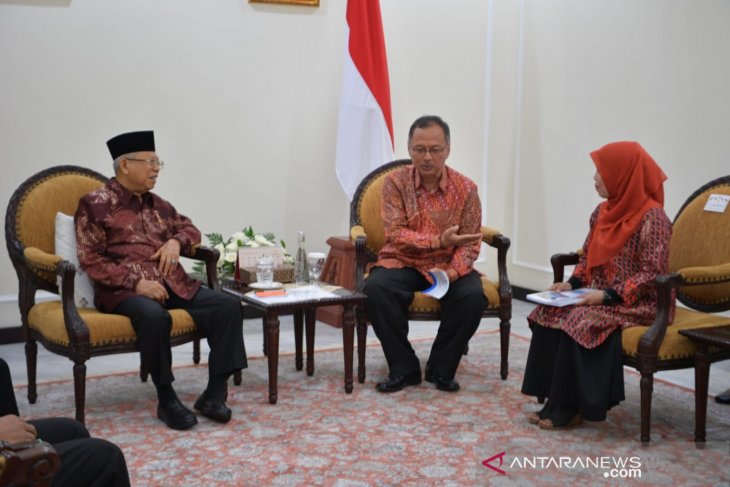
Vice President Ma'ruf Amin received Rector of Malang-based Maulana Malik Ibrahim State Islamic University (UIN) Abdul Haris, at the Vice Presidential Office in Jakarta on Tuesday. (Secretariat of the Vice Presidential Office)
Vice President Ma'ruf Amin received two concepts of developing a sharia-compliant economy through rural areas and Islamic boarding schools (pesantren) from Maulana Malik Ibrahim State Islamic University (UIN) in Malang, East Java, Tuesday. The involvement of the rural community and pesantren can support the conventional economy which has been running well, Abdul Haris, rector of UIN Malang said at the Vice Presidential Office.
"This will greatly help the development of a sharia-compliant economy as a whole. It will not contradict conventional businesses but will complement each other," Haris said.
The development of the two concepts can increase domestic production of halal goods which have become the ideals of the Vice President to utilize them optimally.
The strategy of developing the two concepts of sharia economy involves five related community groups called pancahelik. They are the government as a regulator, the community as an object of development, institutes of higher learning as a training provider, and businessmen and the banking institutions, he said.
"At the UIN Maulana Malik Ibrahim campus, we have started (the concept). Some of the programs are integrated with Tri Dharma, research, education and dedication," he said.
During the meeting, the UIN Malang rector also revealed about the management of alms being used as loans for the community to strengthen the business capital. To date, UIN Malang has channeled loans to residents of 12 villages, equivalent to some 1,500 micro, small and medium businesses (UKM), he said.
"UIN Malang has collected profession alms used as interest-free loans for micro, small and medium businesses. The amount of loans is small with the maximum amount being Rp10 million. Most of the loans amount to Rp2 to 3 million," he said.
At the meeting, the Vice President asked UIN Malang and other institutes of higher learning to develop a people-based economy that could encourage the growth of private businesses in the community. (ANTARA)
December
President Jokowi Prepares Tuberculosis Control Regulation
Written by Ani Hasanah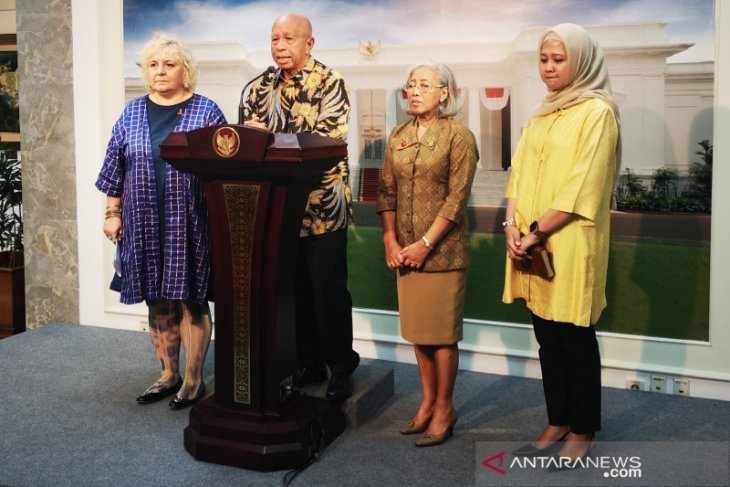
Chief of the Stop TB Partnership Forum for Indonesia (FSTPI) Arifin Panigoro, along with Executive Director of Stop TB International, Lucica Ditio (left) held a press conference following a meeting with President Joko Widodo at the Merdeka Palace in Jakarta on Monday (9/12/2019). (ANTARA)
President Joko Widodo (Jokowi) is preparing a regulation to combat tuberculosis (TBC) in Indonesia, according to Chief of the Stop TB Partnership Forum for Indonesia (FSTPI) Arifin Panigoro.
"One point highlighted by (the president) to ensure smooth cooperation among ministries and institutions is that he is preparing a presidential regulation on combating TBC," Panigoro stated following a meeting with President Jokowi at the Merdeka Palace in Jakarta on Monday.
Through the presidential regulation, not only the Health Ministry but also the Home Affairs Ministry and other relevant ministries can partake in efforts to eradicate TBC, he remarked.
"As we all know, regions in Indonesia have a strong autonomy, so regional heads, including governors and district heads, play a very important role," he noted.
As a civil organization, the FSTPI remains resolved to fight TBC in Indonesia, he emphasized.
"What we are doing is only combating TB or TBC. We will report this to the presidents of Indonesia, China, and India that bear witness to the largest number of TBC cases in the world, so they must be serious about combating it," he stated.
The Health Ministry is solely tasked with combating TB. However, in view of the large problems, the ministry will find it hard to work single-handedly, he pointed out.
"As a civil organization, we are really willing to help the government," he remarked.
The world has set a target of becoming TBC free in a decade’s time, or by 2030, he pointed out.
"This is no easy task to accomplish in Indonesia," he affirmed.
The global tuberculosis report published by the World Health Organization (WHO) indicated that no single country is free from the disease.
In 2017, an estimated 842 thousand Indonesians had contracted TB, caused by the mycobacterium tuberculosis virus, of which 23 thousand developed drug resistance to the disease.
Almost 75 percent of TB sufferers in Indonesia are from the productive age group.
The situation is a threat to fulfilling one of the agendas of the medium-term development plan 2020-2024 in which the country is striving to improve the quality and competitive edge of human resources.
TB is a global disease found in every country across the world. It is the leading infectious cause of death worldwide.
In 2018, an estimated 10 million people had contracted TB worldwide constituting 5.7 million men, 3.2 million women, and 1.1 million children. The cases transcended countries and age groups.
The WHO estimates that 1.8 billion people—close to one quarter of the world's population—are infected with Mycobacterium tuberculosis (M.tb). (ANTARA)




